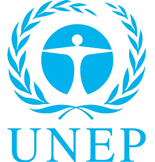|
|
|

Manmohan Singh, Prime Minister of India, with Thiru Raja, Minister of Environment and Forests of India (left), and Shafqat Kakakhel, UNEP Deputy Executive Director (right)
|
|
|
|
|
|
|
Highlights from Thursday, 2 November
|
MOP-18's high-level segment began Thursday morning, with opening statements, election of officers, adoption of the agenda and organization of work, and presentations by assessment panels and other participants. During the afternoon high-level segment, delegates heard statements from senior officials and heads of delegations. The preparatory segment reconvened in the late afternoon to continue work on outstanding issues. Various contact groups and informal consultations also took place throughout the day. |
| Opening of the High-Level Segment |
| Indian Prime Minister Manmohan Singh is presented with flowers (left), and Marco González, Executive Secretary, Ozone Secretariat, welcomes the Prime Minister (right) |
Photographers at the high-level segment (left) and Prime Minister Manmohan Singh with UNEP Deputy Executive Director Shafqat Kakakhel
|
| Prime Minister Manmohan Singh lights the ceremonial lamp to inaugurate the high-level segment (right) |
Manmohan Singh, Prime Minister of India, officially inaugurated MOP-18. He stressed the link between poverty, economic growth and environmental protection, and highlighted India's progress in implementing the Protocol. He noted lessons from the Protocol, including that trade restrictions are not advisable, and that compliance should be more creative and less adversarial. |
| Shafqat Kakakhel, UNEP Deputy Executive Director (center), reaffirmed UNEP's readiness to continue assisting parties in implementing the Protocol, and stressed that political support is vital to overcome the remaining challenges.
Thiru Raja, Minister of Environment and Forests of India, welcomed participants.
|
Namonarain Meena, Minister of State for Environment and Forests (right), reiterated the significance of the interface between the environment and development. |
| Elias Malungula, Democratic Republic of Congo, was elected President of MOP-18 |
| Environment ministers from Pakistan and India meeting on the fringes of the High-Level Segment |
| Japan (left) called for closer cooperation to enable Article 5 parties to comply with their obligations, and reaffirmed its intention to continue providing technology, expertise and funding. Thiru Raja, Minister of Environment and Forests of India,
noted the serious difficulties faced by some Article 5 parties in phasing out CFCs due to the non-availability of feasible alternatives. |
Finland, speaking for the EU (left/), urged synergies with MEAs on chemicals, waste and climate change, and expressed support for transforming UNEP into a specialized agency with a revised and strengthened mandate. Anil Kumar Bachoo, Minister of Environment and National Development Unit, Mauritius (right), stressed the linkages between the Kyoto and Montreal Protocols in the area of HCFCs. He expressed concern that developed countries supported the inclusion of methyl bromide control schedules for Article 5 parties and are themselves falling short of full phase-out. |
The Dominican Republic (left) expressed concern about illegal trade in ODS and about the elimination of CFCs and HCFCs that have a global warming potential. Guinea said that to feel satisfied with progress towards eliminating ODS so far would be to neglect future generations. |
| Presentations by Assessment Panels |
| Scientific Assessment Panel (above) with MOP-18 President and Marco González, Executive Secretary, Ozone Secretariat |
Scientific Assessment Panel Co-Chair Ayité-Lô Ajavon (left) during the presentation by the Panel. David Fahey, Lead Author (center), presented the 2006 update of the “Twenty Questions and Answers about the Ozone Layer,” designed for the general public. A.R. Ravishankara, Scientific Steering Committee of the Scientific Assessment Panel (right), presented the major findings and conclusions of the 2006 Science Assessment (right)
|
| Pierre Pinault, Canada (left), extended his country's offer to host MOP-19 in Montreal. Janet Bornman, Environmental Effects Assessment Panel Co-Chair (right), reported on, inter alia , the relationship between climate change and ozone depletion, and the expected increase in ultraviolet B radiation. |
| Delegatesf from the EC consuting (left); János Maté, Greenpeace International (right), spoke about their solar chip project and noted that the Indian President had purchased some solar chip coolers to show his commitment towards environmentally sustainable energy options |
|



